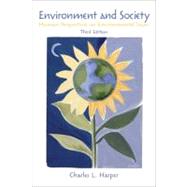
| Introduction | |
| Introduction | |
| Human Systems, Environment, and Social Science | |
| The Earth's Vital Signs and the Human Footprint | |
| The Resources of the Earth: Sources and Sinks | |
| Global Climate Change, Scientific Uncertainty, and Risk | |
| Population, Environment, and Food | |
| Energy and Society | |
| A Sustainable World? | |
| Alternative Futures: Sustainability, Inequality, and Social Change | |
| Transforming Structures: Markets, Politics, and Policy | |
| Environmentalism: Ideology, and Collective Action | |
| Globalization: Trade, Environment, and the Third Revolution | |
| References | |
| Name Index | |
| Subject Index | |
| Table of Contents provided by Publisher. All Rights Reserved. |
The New copy of this book will include any supplemental materials advertised. Please check the title of the book to determine if it should include any access cards, study guides, lab manuals, CDs, etc.
The Used, Rental and eBook copies of this book are not guaranteed to include any supplemental materials. Typically, only the book itself is included. This is true even if the title states it includes any access cards, study guides, lab manuals, CDs, etc.